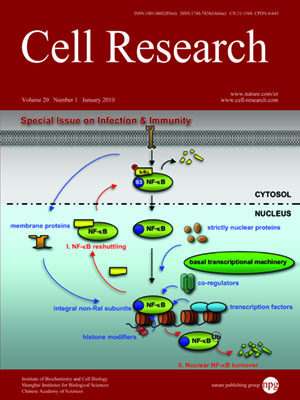
Volume 20, No 1, Jan 2010
ISSN: 1001-0602
EISSN: 1748-7838 2018
impact factor 17.848*
(Clarivate Analytics, 2019)
Volume 20 Issue 1, January 2010: 62-71
ORIGINAL ARTICLES
IL-23 signaling enhances Th2 polarization and regulates allergic airway inflammation
Juan Peng1,2,3,*, Xuexian O Yang1,*, Seon Hee Chang1, Jiong Yang2,3 and Chen Dong1
1Department of Immunology, MD Anderson Cancer Center, Houston, TX 77030, USA
2Department of Respiratory Diseases, Renmin Hospital, Wuhan University, Wuhan 430060, China
3Department of Respiratory Diseases, Zhongnan Hospital, Wuhan University, Wuhan 430071, China
Correspondence: Chen Dong, Xuexian O Yang,(cdong@mdanderson.org; xoyang@mdanderson.org)
IL-23/IL-17 axis is an important regulator in various inflammatory diseases. However, the role of IL-23 in allergic airway inflammation is not well understood. In this study, we show that in an allergen-induced asthma model, mice with transgenic overexpression of IL-23R exhibited increased airway infiltration of eosinophils and Th2 cytokine production, whereas those deficient in IL-23 displayed reduced airway inflammation. In vitro, IL-23-IL-23R signaling promoted GATA-3 expression and enhanced Th2 cytokine expression. Conversely, in the absence of this signal, Th2 cell differentiation was partially inhibited. Therefore, IL-23 signaling may regulate allergic asthma through modulation of Th2 cell differentiation.
Cell Research (2010) 20:62-71. doi: 10.1038/cr.2009.128; published online 24 November 2009
FULL TEXT | PDF
Browse 2236


